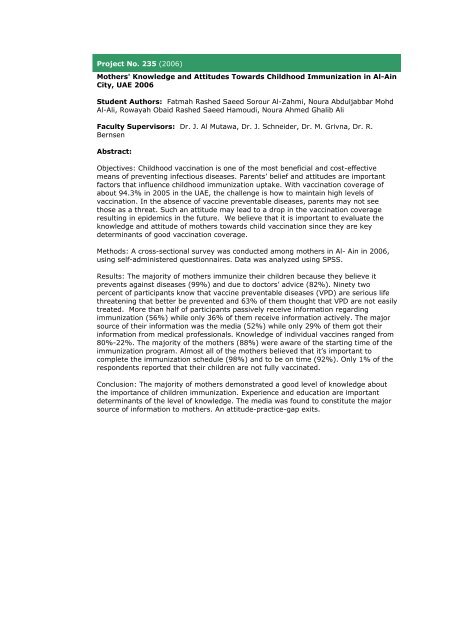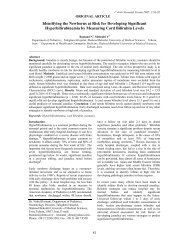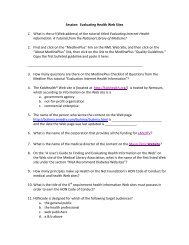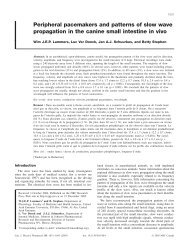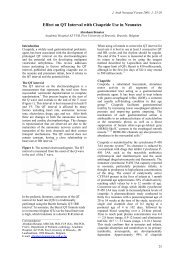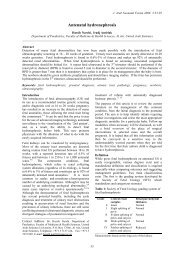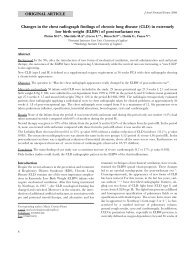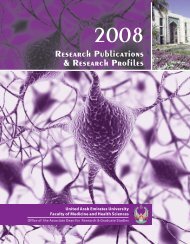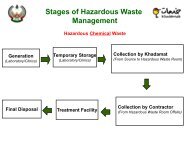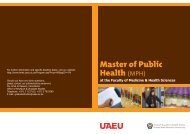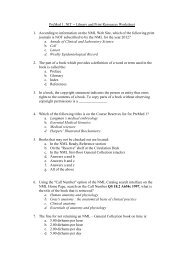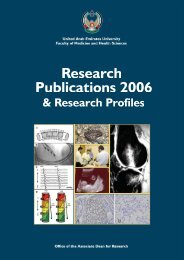- Page 1 and 2:
Community Medicine Senior Clerkship
- Page 3 and 4:
Project No. 1 (1992)A Cross-Section
- Page 5 and 6:
Project No. 3 (1992)Epidemiological
- Page 7 and 8:
Project No. 5 (1992)Caffeine and Bl
- Page 9 and 10:
Project No. 7 (1992)The Prevalence
- Page 11 and 12:
Project No. 9 (1992)Weight and Leng
- Page 13 and 14:
Project No. 11 (1992)Clinical Manif
- Page 15 and 16:
Project No. 13 (1992)Prevalence of
- Page 17 and 18:
Project No. 15 (1992)Knowledge, Att
- Page 19 and 20:
Project No. 17 (1992)The Prevalence
- Page 21 and 22:
Project No. 19 (1992)Prevalence of
- Page 23 and 24:
Project No. 21 (1992)Epidemiology o
- Page 25 and 26:
Project No. 23 (1992)Prevalence of
- Page 27 and 28:
Project No. 25 (1993)Cigarette Smok
- Page 29 and 30:
Project No. 27 (1993)The pattern of
- Page 31 and 32:
Project No. 29 (1993)An Exploratory
- Page 33 and 34:
Project No. 31 (1993)Patient Satisf
- Page 35 and 36:
Project No. 33 (1994)Pulmonary Func
- Page 37 and 38:
Project No. 35 (1994)Leukemia - A D
- Page 39 and 40:
Project No. 37 (1994)The Prevalence
- Page 41 and 42:
Project No. 39 (1994)The Knowledge,
- Page 43 and 44:
Project No. 41 (1994)Common Eye Dis
- Page 45 and 46:
Project No. 43 (1995)Prevalence of
- Page 47 and 48:
Project No. 45 (1995)View Point of
- Page 49 and 50:
Project No. 47 (1995)Benign Anorect
- Page 51 and 52:
Project No. 49 (1995)Diabetes Melli
- Page 53 and 54:
Project No. 51 (1995)The Effect of
- Page 55 and 56:
Project No. 53 (1995)Traditional He
- Page 57 and 58:
Project No. 55 (1995)The Oral Healt
- Page 59 and 60:
Project No. 57 (1995)Assessment of
- Page 61 and 62:
Project No. 59 (1995)Prevalence of
- Page 63 and 64:
Project No. 61 (1995)Sensitivity an
- Page 65 and 66:
Project No. 63 (1995)A Study of Kno
- Page 67 and 68:
Project No. 65 (1995)A Study of Men
- Page 69 and 70:
Project No. 67 (1995)Relations of A
- Page 71 and 72:
Project No. 69 (1995)Waist-to-Hip R
- Page 73 and 74:
Project No. 71 (1995)The Etiologica
- Page 75 and 76:
Project No. 73 (1995)The Prevalence
- Page 77 and 78:
Project No. 75 (1995)Life Style, Be
- Page 79 and 80:
Project No. 77 (1995)Prevalence of
- Page 81 and 82:
Project No. 79 (1996)Causes of UAE
- Page 83 and 84:
Project No. 81 (1996)Menstrual Symp
- Page 85 and 86:
Project No. 83 (1996)Septicaemia in
- Page 87 and 88:
Project No. 85 (1996)Thrombolysis i
- Page 89 and 90:
Project No. 87 (1996)Childhood Home
- Page 91 and 92:
Project No. 89 (1996)An Analytical
- Page 93 and 94:
Project No. 91 (1996)Blood Pressure
- Page 95 and 96:
Project No. 93 (1996)Retrospective
- Page 97 and 98:
Project No. 95 (1996)Acute Abdomina
- Page 99 and 100:
Project No. 97 (1996)Accidents and
- Page 101 and 102:
Project No. 99 (1996)Actual Causes
- Page 103 and 104:
Project No. 101 (1996)Knowledge and
- Page 105 and 106:
Project No. 103 (1996)Morbidity and
- Page 107 and 108:
Project No. 105 (1997)Prevalence of
- Page 109 and 110:
Project No. 107 (1997)Neonatal Mort
- Page 111 and 112:
Project No. 109 (1997)The Prevalenc
- Page 113 and 114:
Project No. 111 (1997)Knowledge and
- Page 115 and 116:
Project No. 113 (1997)Assessment of
- Page 117 and 118:
Project No. 115 (1997)Pattern of Us
- Page 119 and 120:
Project No. 117 (1997)Registration
- Page 121 and 122:
Project No. 119 (1997)Female Adoles
- Page 123 and 124:
Project No. 121 (1997)Aminoacid Pro
- Page 125 and 126:
Project No. 123 (1997)Role of Helic
- Page 127 and 128:
Project No. 125 (1997)The Causes an
- Page 129 and 130:
Project No. 127 (1997)Actual causes
- Page 131 and 132:
Project No. 129 (1998)Pattern of Co
- Page 133 and 134:
Project No. 131 (1998)Epidemiology
- Page 135 and 136:
Project No. 133 (1998)Prevalence of
- Page 137 and 138:
Project No. 135 (1998)Seat Belt Awa
- Page 139 and 140:
Project No. 137 (1998)The Use of He
- Page 141 and 142:
Project No. 139 (1998)Female Adoles
- Page 143 and 144:
Project No. 141 (1998)Mortality and
- Page 145 and 146:
Project No. 143 (1998)Pulmonary Fun
- Page 147 and 148:
Project No. 145 (1998)HIV & HBV - R
- Page 149 and 150:
Project No. 147 (1998)The Health Ef
- Page 151 and 152:
Project No. 149 (C-1998/9)Factors I
- Page 153 and 154:
Project No. 151 (D-1999/0)Relations
- Page 155 and 156:
Project No. 153 (A-1999/0)The Relat
- Page 157 and 158:
Project No. 155 (A-1999/0)Effective
- Page 159 and 160:
Project No. 157 (C-1998/9)Knowledge
- Page 161 and 162:
Project No. 159 (B-1999/0)The Preva
- Page 163 and 164:
Project No. 161 (1999)The Prevalenc
- Page 165 and 166:
Project No. 163 (A-2000/1)Knowledge
- Page 167 and 168:
Project No. 165 (B-2000/1)Descripti
- Page 169 and 170:
Project No. 167 (D-2000/1)A Descrip
- Page 171 and 172:
Project No. 169 (C-1999/0)Thyroid S
- Page 173 and 174:
Project No. 171 (C-1999/0)Physical
- Page 175 and 176:
Project No. 173 (D-2001/2)Contracep
- Page 177 and 178:
Project No. 175 (C-2000/1)A study o
- Page 179 and 180:
Project No. 177 (B-2001/2Missing)Fa
- Page 181 and 182:
Project No. 179 (B-2001/2)Emiratis'
- Page 183 and 184:
Project No. 181 (A-2001/2)An Evalua
- Page 185 and 186: Project No. 183 (A-2001/2)Does Seat
- Page 187 and 188: Project No. 185 (D-2002/3)Major Gen
- Page 189 and 190: Project No. 187 (C-2001/2)Attitude
- Page 191 and 192: Project No. 189 (C-2001/2)Smoking H
- Page 193 and 194: Project No. 191 (B-2002/3)Knowledge
- Page 195 and 196: Project No. 193 (B-2002/3)Internet
- Page 197 and 198: Project No. 195 (A-2002/3)Cardiovas
- Page 199 and 200: Project No. 197 (D-2003/4)Knowledge
- Page 201 and 202: Project No. 199 (C-2002/3)First Aid
- Page 203 and 204: Project No. 201 (B-2003/4)Knowledge
- Page 205 and 206: Project No. 203 (A-2003/4)Knowledge
- Page 207 and 208: Project No. 205 (D-2004/5)First Aid
- Page 209 and 210: Project No. 207 (C-2003/4)Early Det
- Page 211 and 212: Project No. 209 (B-2004/5)Dietary P
- Page 213 and 214: Project No. 211 (A-2004/5)Knowledge
- Page 215 and 216: Project No. 213 (A-2004/5)Assessmen
- Page 217 and 218: Project No. 215 (C-2004/5)Knowledge
- Page 219 and 220: Project No. 217 (2005)Knowledge, At
- Page 221 and 222: Project No. 219 (2005)Prevalence of
- Page 223 and 224: Project No. 221 (2005)Assessment of
- Page 225 and 226: Project No. 223 (2006)Predictors of
- Page 227 and 228: Project No. 225 (2006)Knowledge, At
- Page 229 and 230: Project No. 227 (2006)Knowledge, At
- Page 231 and 232: Project No. 229 (2006)Water Safety
- Page 233 and 234: Project No. 231 (2006)Knowledge, At
- Page 235: Project No. 233 (2006)Knowledge, At
- Page 239 and 240: Project No. 237 (2006)Knowledge, At
- Page 241 and 242: Project No. 239 (2007)Attitude and
- Page 243 and 244: Project No. 241 (2007)Knowledge, At
- Page 245 and 246: Project No. 243 (2007)Traditional V
- Page 247 and 248: Project No. 245 (2008)Epidemiology,
- Page 249 and 250: Project No. 247 (2008)Prevalence of
- Page 251 and 252: Project No. 249 (2009)Prevalence of
- Page 253 and 254: Project No. 251 (2009)Knowledge, at
- Page 255 and 256: Project No. 253 (2009)Knowledge, at
- Page 257 and 258: Project No. 255 (2009)Prevalence an
- Page 259 and 260: Project No. 257 (2010)Knowledge, at
- Page 261 and 262: Project No. 259 (2010)The burden of


